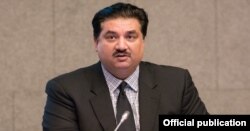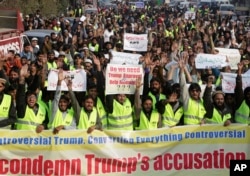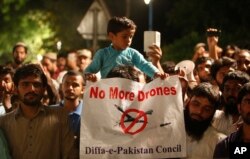Pakistan's defense minister is expressing concern about a White House statement saying the U.S. military has been given authority to eliminate militant safe havens in Pakistan.
The White House statement was published deep within a late Tuesday email to the press that listed Donald Trump's foreign policy accomplishments during his first year as president.
"President Trump's conditions-based South Asia Strategy provides commanders with the authority and resources needed to deny terrorists the safe haven they seek in Afghanistan and Pakistan," the White House statement read.
In an interview with VOA's Urdu Service, Pakistani Defense Minister Khurram Dastgir Khan said he takes the statement "very seriously."
"We want to make it clear to the U.S. that Pakistan is a sovereign country and its sovereignty must be respected," Kahn said.
"Instead of using these words, which can be interpreted in any way, Pakistan should be consulted," he added. "Statements like this are taking us away from peace in Afghanistan."
At a Thursday Pentagon press briefing, Joint Staff Director Marine Corps Lt. Gen. Kenneth McKenzie said the U.S. military doesn't "contemplate military operations inside Pakistan."
"Through a variety of measures, we look to gain Pakistani cooperation and assistance as we pursue operations in Afghanistan, but no, we're not planning to conduct military operations inside Pakistan," McKenzie said.
Relations deteriorating
Pakistan-U.S. relations have deteriorated rapidly. Last month the Trump administration cut nearly all security aid to Islamabad until the country takes stronger steps to deal with terrorist networks operating in its territory.
The U.S. has long accused Pakistan of allowing safe haven to terrorists who carry out deadly attacks in neighboring Afghanistan, where the U.S. is entering its 17th year of war. Pakistan denies the accusation.
In a January tweet, Trump accused Pakistan of "lies and deceit" over the issue.
Drone strikes
Reports have suggested U.S. officials are also discussing expanded drone strikes in Pakistan. Since 2004, the U.S. has carried out hundreds of such drone attacks, mostly along the Afghan border in northwest Pakistan. Those attacks had fallen off in recent years.
The White House National Security Council did not immediately respond to a VOA question about whether the U.S. has changed its policy on additional military operations inside Pakistan, or whether the White House email was a misstatement.
Shamila Chaudhary, director for Pakistan and Afghanistan at the National Security Council under former President Barack Obama, said the Pakistani defense minister is likely interpreting the statement correctly.
"It's not a misreading. That's exactly how anyone would interpret it," Chaudhary told VOA. "This suggests they might change the rules to apprehend insurgents" across the border in Pakistan.
Chaudhary said the statement is consistent with the Trump administration's overall South Asia policy. In his August speech unveiling that policy, Trump said the U.S. "must stop the resurgence of safe havens" in both Afghanistan and Pakistan.
In his State of the Union address, Trump did not mention Pakistan directly. But he did say he asked Congress to pass legislation to help ensure that U.S. assistance dollars "always serve American interests, and only go to America's friends."
Carla Babb at the Pentagon contributed to this article.







